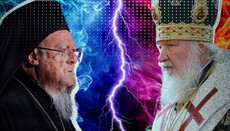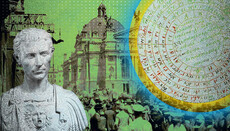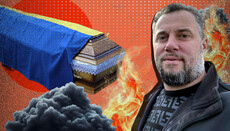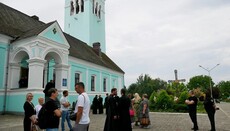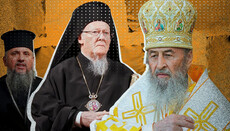Does Patriarch Bartholomew call for “sacred unity” with Allah and Brahman?
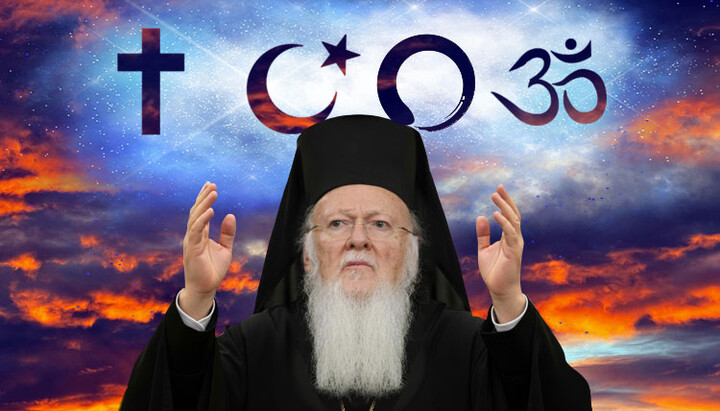
In his address to the World Council of Religions, the head of Phanar outlined the problems of humanity and the method of their solution. Quite unusual for the "head of Orthodoxy".
On July 29, 2025, a meeting of the World Council of Religions for Peace took place in Istanbul, during which Patriarch Bartholomew delivered a keynote address entitled "Contradictions and Preconditions of Interfaith Dialogue".
The speech was composed in highly complex language, full of philosophical formulations. It gives the impression of being intentionally crafted to produce the effect described by a well-known student phrase: “incomprehensible, but impressive.” Lengthy musings, elaborate phrasing – all delivered in a style very far removed from the Gospel and from Christianity as such. And then suddenly, near the very end, a few words about Christ. True words – but utterly insufficient to express a Christian understanding of the world’s problems and the means of resolving them. The subjective impression is that the paragraph mentioning our Lord Jesus Christ was inserted simply because without it, the entire address would have sounded completely unnatural coming from someone who calls himself the Ecumenical Patriarch.
There is another noteworthy point. At the beginning of his address, Patriarch Bartholomew recalled the historical mission of the Patriarchate of Constantinople in the world: “In this City, whose stones still bear the echo of centuries where the oecumene was defined not as a geographical expanse but as a spiritual horizon, and where the Ecumenical Patriarchate of Constantinople continues to bear witness to the universal calling of Orthodox Christianity.” We will return to this statement later.
Brief note
The organization Religions for Peace is the world’s largest international coalition of representatives from all major religious traditions, united in pursuit of peace, social justice, and the protection of human rights. Founded in 1970, it is headquartered in New York and operates in over 90 countries, holding consultative status with the United Nations. Its core mission is to promote interreligious cooperation in addressing global challenges. Religions for Peace organizes forums and dialogues between representatives of various faiths, engages in peacebuilding missions in conflict zones, delivers humanitarian aid to refugees (including food and medicine), defends the rights of religious minorities, advocates for environmental issues, runs international camps and training programs for young believers of different religions, combats domestic violence, and more.
In other words, the audience of Patriarch Bartholomew was religiously very diverse. This was likely the reason why his address included ideas that reached far beyond the bounds of Christianity. However, from our perspective, such an approach is unacceptable – especially considering that many of his predecessors fought to the end for the purity of the faith and upheld the exclusive truth of Christianity.
What is the problem?
Patriarch Bartholomew sees the main problem of humanity in the dominance of materialism in the consciousness of modern man. A quote: "The diagnosis, as it is articulated in the context of the initiative "Religions for Peace," recognizes as a fundamental problem a dominant, usually unavowed, worldview. It concerns a prevailing materialism with a character of reductive simplification, a way of viewing the real that contracts human flourishing to its material dimension, systematically excluding any reference to the Sacred." Complex, isn't it? Translated into plain language, this means that the problem of humanity lies in being consumed by material concerns while forgetting the spiritual.
This could be agreed upon if Patriarch Bartholomew opposed the craving for material to the striving for God, not just to the abstract "sacred." Because we know that in the spiritual realm, there is not only God but also various spirits, both evil and good, angels and demons. Mixing them into one "sacred" is unacceptable. And Patriarch Bartholomew, unfortunately, does exactly this, as will be evident from the further analysis of his address.
According to the head of Phanar, the consequence of the dominance of a materialistic worldview is... No, not the sinfulness of man, not the departure from God. And not the main passions described in the Gospel: greed, vanity, and lust. A quote: "The consequence of this worldview is not simply philosophical; it is profoundly existential and social. The Distortion of the concept of human completeness promotes isolation, exploitation and environmental destruction."
That is, as a result of preferring the material to the abstract "sacred," the following occurs:
- individualization, the separation of man from society, and probably the resulting egoism;
- exploitation of man by man;
- environmental destruction.
Everything seems correct. But such could be voiced by some follower of Marxism or other similar theories, but certainly not the head of the Church. After all, the Gospel speaks of something entirely different.
In turn, all this, according to Patriarch Bartholomew, leads to two more problems. A quote: "The crisis of modernity is not an abstract philosophical condition. It is a tangible reality that takes on flesh and bones in two, seemingly unconnected between the, but profoundly related phenomena that haunt the global community: the unliftable weight of global debt and the uncontrolled emergence of artificial intelligence."
According to Patriarch Bartholomew, world debt is a modern form of slavery, and AI threatens to turn the human personality into a complex biocomputer that, instead of love, creativity, freedom, and so on, simply operates with a vast array of data and, using algorithms, predetermines human behavior.
All this, of course, is true, but the root of the problems is not there. Patriarch Bartholomew (or whoever wrote this address for him) ventures into areas where he is completely incompetent. For example, the total national debt, which in 2025 reached 102 trillion dollars, is distributed extremely unevenly. The top twenty biggest debtors are not poor backward slave states but quite prosperous and free countries of Europe, the USA, Singapore, Japan, and so on. Conversely, Africa, which accounts for only 2% of the world debt, is notorious for its backwardness, poverty, and more.
Certainly, world debt is a big problem; it indeed contributes to the impoverishment of people, but even in the field of economics, it is not recognized as the main problem. By the way, an interesting paradox arises: Patriarch Bartholomew, calling for the resolution of the national debt problem, voices the interests of the biggest debtors, i.e., the richest countries in the world.
As for AI, throughout most of human history, the majority of humanity was not considered persons at all. For example, in the Middle Ages, the behavior of serfs was entirely determined by the landowning nobility: which god to believe in, whom to marry, whom to fight, and so forth. Algorithms were not even needed. The official Church usually reinforced and justified such a social order. For instance, in Catholicism, there was a ban on reading the Scriptures, so the flock wouldn’t realize that the words spoken from the pulpit didn’t correspond to the Gospel, thus preventing unwanted questions.
No one disputes that the problems voiced by the head of Phanar are important. But this is not the main thing.
The main problem of humanity is death, which is understood not just as the separation of the soul from the body, but primarily as the separation of man from God.
From this follows the sinfulness of man, from which, in turn, all other problems arise, including AI and world debt. Without solving this fundamental problem, everything else is futile. At most, a temporary relief of symptoms. But this is precisely what the one who calls himself the leader of Orthodoxy does not address. However, even more surprising is the path he proposes to solve the challenges voiced.
What to do?
Patriarch Bartholomew proposes to counter the fragmentation caused by materialism with the form of an ambitious intellectual edifice: the “Common Sacred Worldview,” a framework that aspires to function as the theoretical foundation for a “Common Sacred Prosperity”. This "Common Sacred Worldview" is the very tower that Patriarch Bartholomew suggests building and compares to the Tower of Babel in his report.
It is very strange to hear this from the head of one of the local Orthodox Churches. After all, the Holy Scriptures do not know any "Common Sacred Worldview"; there is only one unchanging Truth, Our Lord Jesus Christ. Moreover, there is no "Common Sacred Prosperity"; there is the Kingdom of God, which Patriarch Bartholomew is not referring to.
At the same time, he clarifies that he does not propose to create a new religion or anything like that. A quote: "This is not an attempt to create a new, syncretistic religion, nor a substitution for the unique worldviews that characterize each religious tradition. Its purpose is, on the contrary, the highlighting of a field of consensus, the mapping of those points where the different experiences of the Sacred converge, creating a common front against the dominion of materialistic reductionism."
But as far as it goes, there are no such points of convergence. The Apostle Paul speaks about this directly: “Do not be yoked together with unbelievers. For what do righteousness and wickedness have in common? Or what fellowship can light have with darkness? What harmony is there between Christ and Belial? Or what does a believer have in common with an unbeliever? What agreement is there between the temple of God and idols?” (2 Corinthians 6:14-16).
Christ and Belial belong to the spiritual realm, the “sacred,” as Patriarch Bartholomew literally says. A quote: “This framework (the concept of the ‘Common Sacred Worldview’ – Ed.) articulated around four fundamental pillars, which constitute a holistic view of reality. At the center lies the Sacred itself, the ultimate, absolute reality, which is expressed in various ways, as God, Allah, Brahman or as the Luminous Void.”
To be honest, this is shocking.
To say that God and the “Luminous Void” are simply different names for the same thing is, for the Ecumenical Patriarch, appalling. Mixing Christianity with Islam, Hinduism, and “the Void” clearly borders on heresy.
And this is entirely consistent with the historical legacy of the Constantinople Patriarchate, which Patriarch Bartholomew himself mentioned at the very beginning.
In 1180, a Council was held in Constantinople to address the question: Is the God of Christians and Muslims the same? The Council’s decree reads: “Anathema to Muhammad and his teaching delivered in the Quran, in which he confesses that the Lord, God, and our Savior Jesus Christ is not the Son of God; he calls good evil and light darkness; anathema to his foul teaching, which contradicts the sacred instructions of Christ and the godly saints, and anathema to whoever inspired him to think and teach these foul and despicable things, whether a human or the prince of demons and father of evil, or if the foul Muhammad himself bore such hideous fruits; furthermore, anathema to those who consider Muhammad a prophet and messenger, from whom they received teachings and commandments contrary to the teaching of Christ.”
This “Sacred” that Patriarch Bartholomew regards as common to all religions is one of the four fundamental pillars of the “Common Sacred Worldview.” Here are the other three pillars:
- “human beings are conceived as by definition relational beings”;
- “society is not a simple sum of individuals, but a ‘whole of whole human beings’, a structure of reciprocity between persons and the institutions of the common good family, education, economy”;
- “the Earth and the network of its life, regardless of whether they are considered sacred in themselves or expressions of the Sacred, are recognized by all traditions as founded on the Sacred.”
The second and third pillars are essentially the same, meaning the “Common Sacred Worldview” consists of:
- the “Sacred” (God) under different names (this is known as perennialism – the belief that God is one in all religions);
- the community of people for the common good (this is essentially communism);
- The “sacredness” of the environment (this is pantheism).
No further comments are necessary.
Insert on Christianity
As already mentioned, whoever wrote or edited the address for Patriarch Bartholomew apparently decided to include at least a few words about Christianity. Otherwise, it would have sounded quite strange. The insert is very brief, so here it is in full: “The Christian testimony, more specifically, offers to this dialogue a perspective that does not seek to dominate, but to serve: the image of God as a communion of Persons, as an eternal relationship of love. Peace, under this prism, is not a static state of equilibrium, but a dynamic, eschatological reality – the expectation of a final reconciliation of all things in Christ. The common action of the religions, therefore, draws its deepest meaning not from an existing agreement, but from a common hope for a future world of justice and love.”
Indeed, in the end, all things are to be reconciled in Christ, as the Apostle Paul writes: “When all things are subjected to Him, then the Son Himself will also be subjected to the One who subjected everything to Him, so that God may be all in all” (1 Corinthians 15:28).
But first of all, when speaking about eternal life in love, one cannot ignore eternal death: “Then they will go away to eternal punishment, but the righteous to eternal life” (Matthew 25:46).
Hell also exists. It awaits those who knew of Christ and did not believe: “Whoever believes in him is not condemned, but whoever does not believe stands condemned already because they have not believed in the name of God’s one and only Son” (John 3:18).
And secondly, the reconciliation of all things in Christ is by no means a “shared hope” of all religions. The Hindu hope is to attain moksha, i.e., liberation from the cycle of rebirths (samsara) and merging with the Absolute (Brahman). The Muslim hope is Jannah (Paradise), which is described as follows: “Indeed, the righteous will be in a secure place — among gardens and springs. Dressed in silk and brocade, sitting face to face. Thus it will be! And We shall marry them to fair ones with large, [beautiful] eyes” (Qur’an 44:51–54). The houris, by the way, are not earthly women but heavenly virgins “with downcast eyes, untouched before them by man or jinn” (Surah Ar-Rahman, 55:56), created specifically to delight the inhabitants of Jannah. Additionally: “The inhabitant of Paradise will be given the strength of a hundred men in eating, drinking, sexual desire, and intercourse” (Sahih al-Bukhari, Hadith No. 3257 (2536)).
Is there anything in this that resembles Christianity? The answer is obvious.
At the same time, Patriarch Bartholomew said nothing about the cornerstone of Christianity being our Lord Jesus Christ. “As Scripture says: ‘See, I lay in Zion a chosen and precious cornerstone, and the one who trusts in Him will never be put to shame’” (1 Peter 2:6). And that He is the only one who can resolve all the problems of humanity. Without Christ, no problem can be truly solved. The Lord says of Himself: “I am the way, and the truth, and the life. No one comes to the Father except through Me” (John 14:6).
There is no other way to God, just as there is no other true solution to the problems of humanity. But something entirely different follows from Patriarch Bartholomew’s address: he proposes a kind of “Common Sacred Worldview” in which even God can be called by different names.
A bit of history again
But on the Constantinople throne, whose significance Patriarch Bartholomew so often emphasizes, there once sat many holy hierarchs who tirelessly affirmed that there is no salvation outside of Christ.
For example, St. John Chrysostom (4th–5th century) said: “All those who believe in the Son have eternal life; but those who do not believe are already condemned, because they have not believed in the name of the only-begotten Son of God.”
Many other Patriarchs of Constantinople spoke in the same way: Proclus of Constantinople (5th c.), Germanus of Constantinople (7th c.), Nicephorus the Confessor (9th c.), Photius the Great (9th c.), and many others.
Let us only hope that Patriarch Bartholomew will follow his holy predecessors. For now, unfortunately, he is walking a different path, and leading his flock down that path as well.
